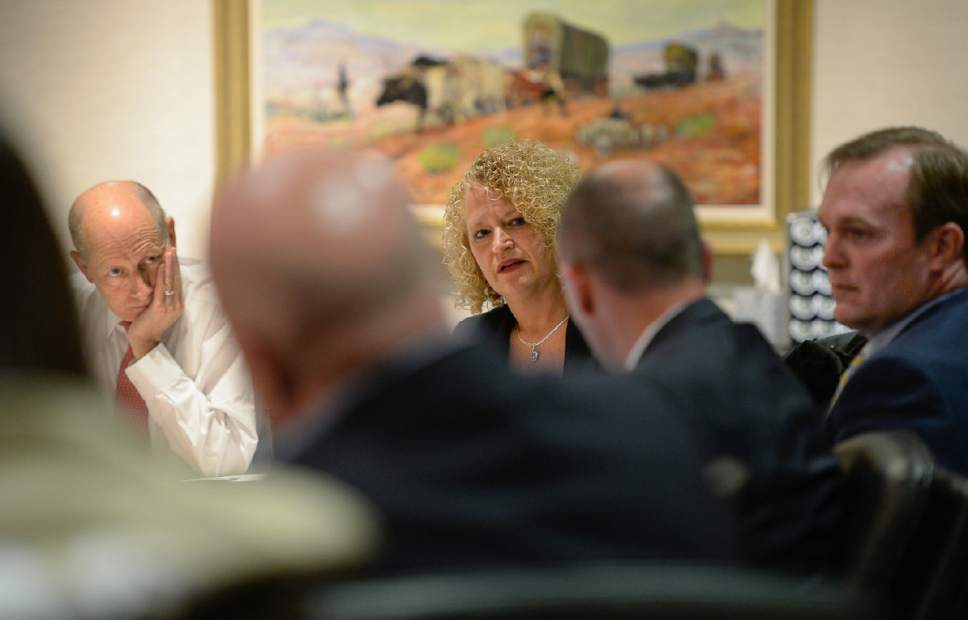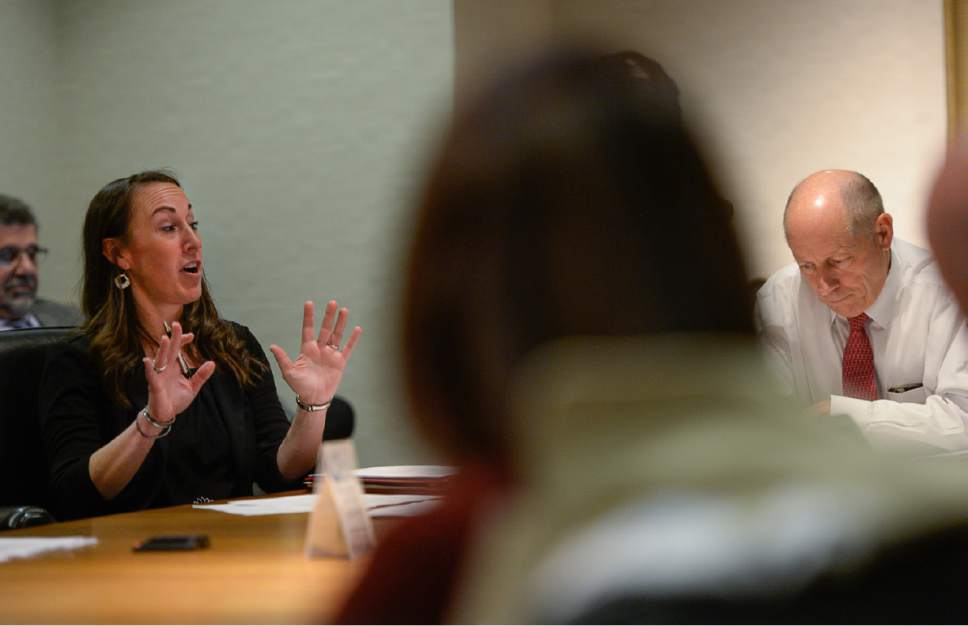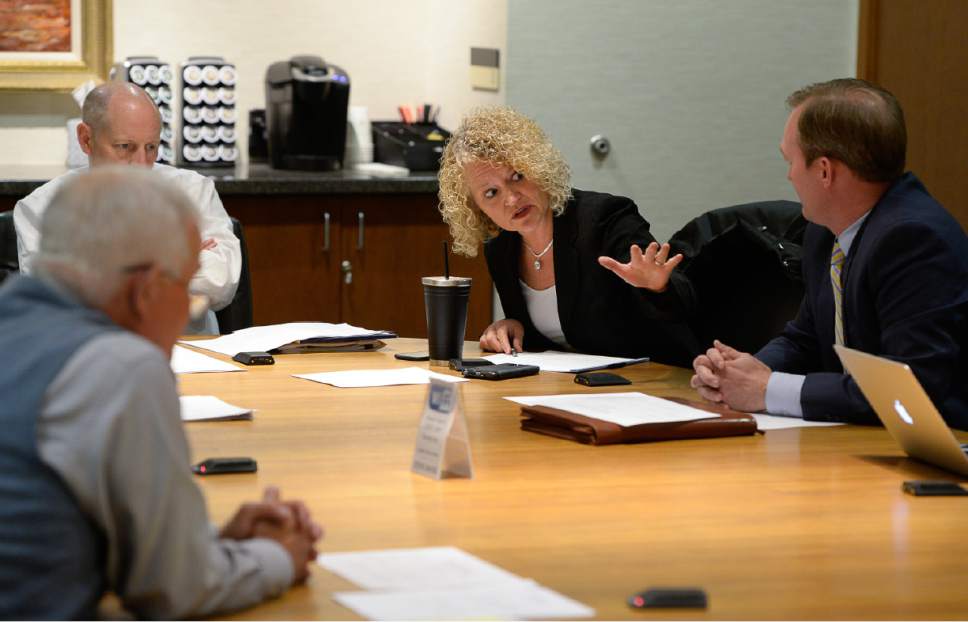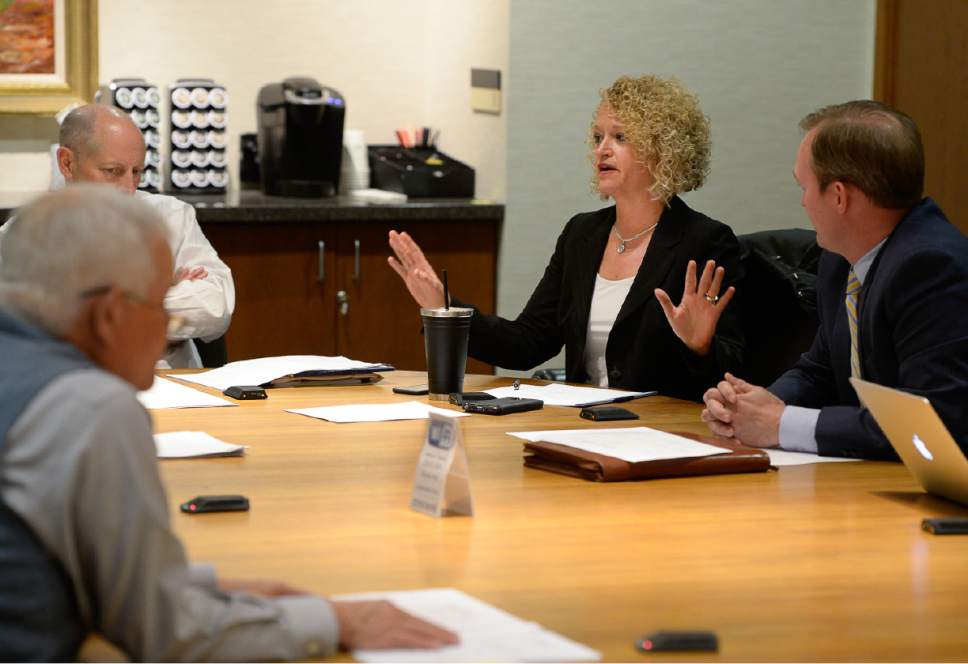This is an archived article that was published on sltrib.com in 2017, and information in the article may be outdated. It is provided only for personal research purposes and may not be reprinted.
The genders that will be served by three new area homeless shelters have been decided upon, the public learned during a news-laden and at times tense meeting of the nonprofit board that will oversee them.
Comments during the meeting revealed that a shelter in Salt Lake City at 131 E. 700 South will serve women; another, at 275 W. High Ave., will serve a gender-segregated population that data indicate will be mostly men; and a third, at 3380 S. 1000 West in South Salt Lake, will house men.
Thursday's Shelter the Homeless meeting also saw philanthropist Gail Miller and developer Josh Romney added to its growing board by unanimous vote, alongside an agreement to purchase the South Salt Lake shelter property.
But before those details were ironed out during a closed session, Salt Lake City Mayor Jackie Biskupski aired concerns in a public portion that exposed growing pains for the nonprofit board — which in the previous three decades met infrequently to act as landlord to a handful of properties and suddenly has wide-ranging influence over a soon-to-be revamped system of homeless services.
"We're getting some pushback on the architect that we had hired," Biskupski said. "… I think we need to better understand, one, why the city isn't being included in discussions around the architect that we agreed to hire, that we have in writing an agreement to hire, and now we're saying we can't use our architect, or we're being told we can't."
The city is negotiating with A.J.C. to finalize its contract for the two shelters, which city officials have expressed a desire to design so the structures produce as much energy as they consume. Salt Lake City's $125 million Public Safety Building at 475 S. 300 East is one such example of a "net zero" building.
Biskupski said she had wanted the board to approve the architect at Thursday night's meeting. Shelter the Homeless Executive Director Janell Fluckiger — a county employee who is essentially on loan to the nonprofit for a year — said she'd decided to hold off "until we have better budget projections," lest "we commit ourselves to funding that might be way outside of our budget."
What followed was more than 15 minutes of back-and-forth between Biskupski and other board members, some growing exasperated. Biskupski wondered about the board's grasp of existing agreements, like the city's memorandum of understanding with Salt Lake County, and its commitment to inclusion and transparency.
The conversation at one point took an abrupt turn toward Biskupski's belief that the gender populations had been determined during negotiations with state legislators, who contributed $27 million toward the collective effort to reduce homelessness. She had said as much previously while Salt Lake County Mayor Ben McAdams — while navigating the selection of the third, all-male site — had insisted that they weren't yet settled on.
"A deal was brokered on populations, and you are well aware of that," Biskupski said to McAdams.
"I wasn't part of that conversation," he said.
"No, but your staff was, and so was my staff," she said, as McAdams said, "No. No."
"Ben — and it was announced even at the [February] announcement, when we disclosed the new model of three resource centers," she said.
"That's not my recollection, but I'm happy to try and find a way to move forward" McAdams said.
"And I'm happy to bring into the fold [House Speaker Greg Hughes] and others to help you understand exactly what happened," Biskupski shot back.
Later, when Biskupski reiterated that she wanted her constituents to have a voice in the design of the shelters and to ensure their success, Lt. Gov. Spencer Cox interjected, "Mayor, I don't think anybody is challenging you right now"
"Well, I'm telling you, the pushback ..."
"Look, I get it," he said, cutting her off. "We've heard it. We understand you have some concerns. This is a new organization. We're all trying to work through this. We're going to work through this. You've said your piece. I think we're good."
She continued: "I don't think we are good, and that's my concern."
"OK, we understand that," he said. "You've made it very clear to all of us that you're not good with the process."
Asked after the meeting whether she was satisfied by the explanations she received, Biskupski said: "We still have some conversations we need to have, but they will occur."
McAdams said afterward that he was "surprised at the outburst," "because I'm not aware of any tensions. I think we're all working to move this forward."
Miller and Romney were among at least 10 people who had shown interest in open spots on the board — including representatives from South Salt Lake and Midvale. South Salt Lake Mayor Cherie Wood attended part of the meeting Thursday but was not immediately available for comment.
"These are people that have done so much to address the challenges around homelessness," McAdams said of Romney and Miller. "Josh has been on our [homeless services programming] committee from the beginning. Gail's a compassionate person who's done so much."
The prospect of a Romney nomination last month drew objections from officials at Crossroads Urban Center, a nonprofit that serves low-income Utahns. Romney's background as the wealthy son of a former Republican presidential candidate leaves him unfit to understand the plight of the homeless, they said.
Romney said then he wasn't actively lobbying for selection but that he hoped to serve in some capacity after having worked near the 210 S. Rio Grande St. emergency shelter and tried to better understand the homeless community. He leases his former office on Pierpont Avenue, he said, but he owns no other property in the area.
Although Romney is a member of the Pioneer Park Coalition — a group of developers, business owners and residents that embraced what Crossroads officials regarded as a wrongheaded 21-point plan by Salt Lake County Sheriff Jim Winder to manage the area's homeless population — he has said the coalition doesn't speak for him, and that elements of Winder's plan are unrealistic.
Jean Hill, director of government relations for the Catholic Diocese of Salt Lake City, put in after Thursday night's unanimous vote that she hoped future nominations would be made with a mind toward those who have life experience in the homeless community.
Miller, in tandem with former Salt Lake City Mayor Palmer DePaulis, led the site selection committee that spent the better part of two years identifying criteria for Salt Lake City's shelters.
Twitter: @matthew_piper









